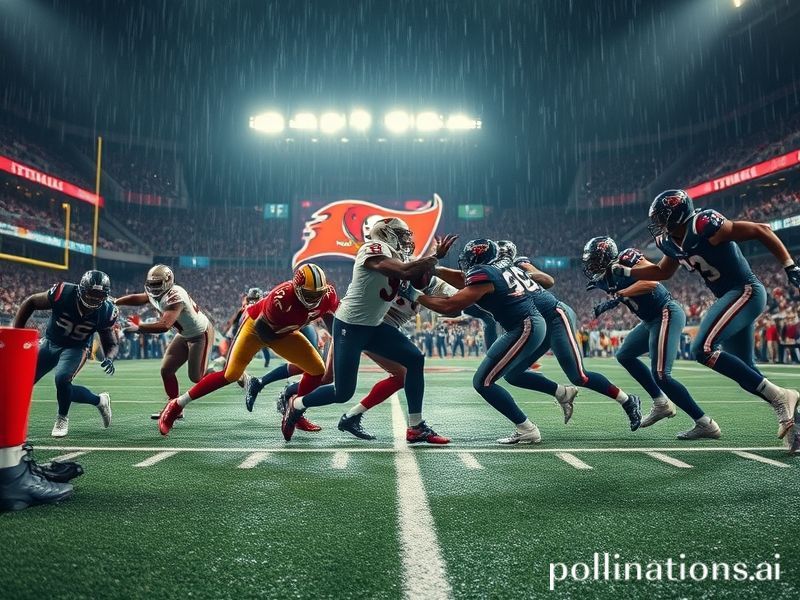Texans vs Buccaneers: The Global Gladiator Game That Explains Modern Civilization (and Its Absurdities)
Texans vs Buccaneers: How a Floridian Squall and a Lone-Star Dust-Up Became the World’s Weirdest Diplomatic Rorschach Test
————————————————————————————————————————
Rome had its gladiators, London its football hooligans, and now—because history insists on punchlines—planet Earth has the Houston Texans and Tampa Bay Buccaneers, two professional American football teams whose meeting on a Sunday evening in NRG Stadium somehow registers on seismographs from Lagos to Lahore. To the uninitiated foreign correspondent, this looked like twenty-two heavily armored millionaires playing catch while the rest of us stockpiled existential dread. But peer closer and the game becomes a geopolitical mood ring: all the anxieties of late capitalism wrapped in spandex and monetized for global streaming.
Let’s begin with the obvious. The Texans—named after the people who once fought for independence and now fight for parking—entered the matchup with a quarterback situation so fluid it could be labeled a new state of matter. The Buccaneers, meanwhile, arrived piloted by Baker Mayfield, a man whose career has resembled a Ryanair flight: periodic turbulence, surprise landings, and the lingering suspicion everyone overpaid. Yet 180+ nations tuned in, not for the X’s and O’s, but for the comforting illusion that somewhere, rules still apply and scoreboards still resolve arguments. After a year in which coups were live-tweeted and climate summits ended in buffet lines, the binary clarity of touchdowns versus turnovers feels downright utopian.
Across Europe, bars that once debated Greek debt now dissect red-zone efficiency. In Seoul, the game aired opposite parliamentary hearings on AI regulation; the younger demographic chose third-and-long replays over secondhand democracy. Analysts in Nairobi track the NFL’s digital footprint the way their predecessors monitored Cold War radio signals—evidence, perhaps, that imperialism now wears cheerleaders. And in Moscow, state television cut to the matchup between segments on “why the West is crumbling,” apparently unaware that crumbling looks suspiciously like a $15 beer in a souvenir cup.
What does it mean when a provincial American sport colonizes the global attention span? For one, it proves that spectacle is the last universally translatable currency. The Bundesliga may have precision, the Premier League may have narrative arcs, but only American football sells the promise of controlled explosions every forty seconds. The Texans-Bucs collision delivered exactly that: bone-jarring hits, tactical trickery, and the sort of officiating reviews that make the United Nations Security Council look brisk by comparison. By the fourth quarter, the scoreboard (Bucs 37, Texans 33 if you’re betting in Macau) felt secondary to the worldwide water-cooler consensus: our species can still synchronize around something, even if that something is a fourth-string tight end fumbling away the over.
There were, naturally, casualties. Houston’s defense surrendered yards like a Swiss banker surrendering account details. Tampa Bay’s secondary looked so porous it could qualify for EU membership. And somewhere in the metaverse, a crypto-bookie wearing a VR headset lost the GDP of Malta on a prop bet about whether the halftime show would exceed two songs. (It did not. RIP, liquidity.)
Still, the broader significance glints beneath the absurdity. The NFL’s international revenue just crossed the $2 billion mark—proof that when the world can’t agree on carbon limits, it will still agree on luxury suites. The Texans’ postgame locker room spoke of “moral victories,” a concept familiar to anyone who has ever read a communiqué from the World Trade Organization. The Buccaneers, meanwhile, flew home to prepare for Munich, where they will peddle this same circus to 70,000 Germans who have memorized every playbook but can’t quite master the concept of unlimited refills.
So the Texans and Buccaneers leave us with the usual gift: a small reminder that while nations scramble to de-escalate, currencies wobble, and glaciers file their resignation letters, we can still gather—virtually or virus-ally—to watch oversized humans chase an oblong ball across astroturf. Plato worried about bread and circuses; we upgraded to keto and 4K. Same decadence, better resolution.
In the end, the game ended, the highlights looped, and the planet spun on, slightly dizzier but momentarily united in the knowledge that somewhere, someone in a Tom Brady throwback jersey was arguing with a stranger on the internet about play-action. Humanity may not survive the century, but give us credit: we’ll go down arguing about the blitz package.







